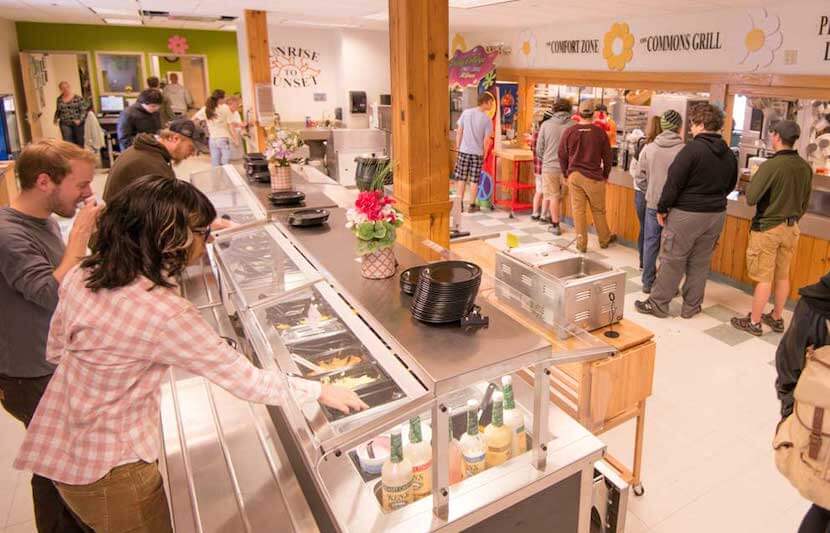Unity College prides itself on being America’s Environmental College, and its many sustainability projects, including its quick transition to zero waste in its dining and catering facilities, supports that assertion.
The college’s efforts to have zero waste in its dining and catering facilities were rewarded when Dining Services recently won the gold Sustainability Award in the waste management category from the National Association of College and University Food Services (NACUFS).
Unity College was able to achieve remarkable results in just 8 months. The zero-waste program was implemented in August 2016, when the college examined the carbon footprint of its dining and catering facilities and realized how much waste was generated from food, utensils, napkins, and other disposable items.
The college’s Dining Services collaborated with the Sustainability Office and local business Exeter Agri-Energy to achieve its goal.
The timing also worked out perfectly as Exeter Agri-Energy, a local renewable energy company that converts animal and food waste into heat and electricity, happened to be looking for more raw organic waste for their process at that time.
Previously, food waste had been taken to local farms to feed pigs, which had its limitations, as only certain food waste could be used for that purpose and the method didn’t allow for disposal of plastic utensils, napkins and to-go cups.
The results for the 8 months between August 2016 and March 2017, the period measured for the award, were outstanding: Unity College diverted 26.6 tons of organic waste from landfills and raised the overall campus diversion rate from 37 percent to 47 percent.
“At America’s Environmental College, we understand that natural resources are finite and have to be managed so very carefully,” said Melik Peter Khoury, president of Unity College.
“Waste reduction within our food system is a very tangible example – it’s also a natural teaching opportunity for our students. We’re proud that NACUFS recognizes the work our team has done to integrate our college farm and available technology into our food systems as a model of sustainability education at work.”
How did Unity College achieve its goal so quickly?
Jennifer deHart, chief sustainability officer at Unity College, attributes the program’s success to the people involved in the program.
“If I had to pinpoint one factor in our rapid adoption of sustainable dining, I would credit our human resource: the staff, faculty, and students who engage in the sustainable food system,” she said.
“Sustainability is the mission of Unity College, and that often means that employees are attracted to work here because our institutional values reflect their personal values. We asked dining services employees for ideas, and they suggested several actions they were eager to undertake.”
Measures undertaken by Unity College Dining Services to achieve its goal include:
- Purchasing 100 percent BPI certified products that can be recycled, and new organics bins and updated signage, which made it easier to sort organic waste from trash;
- Providing consistent peer education by sustainability work study students at the start of each semester;
- Training of dining staff by partner organizations on the new process;
- Adding a ramp and lighting to an existing storage shed that serves as the central collection site; and
- Reducing pre-consumer waste in the dining and catering facilities by making the best use of products, such as making pickles from watermelon rinds, blending vegetable scraps into homemade marinara sauce, and using vegetables that are imperfect and considered unusable for homemade hot sauce and ketchup.
“Dining Services is pleased to lead the campus in waste minimization with our very visible organic collection program,” said Lorey Duprey, director of dining services at Unity College.
“Zero waste has become a critical part of our sustainable dining brand.”
While Unity College had higher upfront costs from introducing the zero-waste program, they were offset by lower costs for waste pickups.
The zero-waste program has been so successful that Unity College is extending it from its dining and catering facilities to its residence halls.
“We are piloting the collection of soiled paper towels from restrooms, which can be mingled with the organic waste,” said deHart. “We view our campus as a living laboratory, and rely on data from student campus projects to determine the next opportunities for waste minimization.”
In line with its mission to reduce waste, Unity College also has in place campus move-in and move-out programs designed to minimize waste.
It also recently partnered with a major office supply company to reduce packaging, so the college’s products are delivered in returnable plastic totes instead of disposable cardboard boxes.
“The students, staff, and faculty at Unity College are eager to make a real, positive impact on their world, and I am proud that our Sustainability Team constantly looks for new ways to help our campus community minimize waste,” deHart said.



